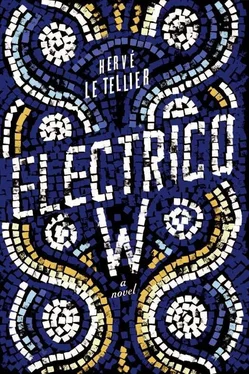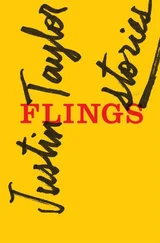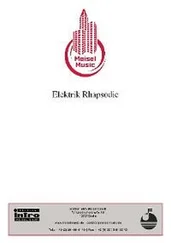“Look at this, Baby, do you recognize her? This man says she lived here.”
He rubbed his hand over his sweating face.
“I work nights, so, you know, people from the building …”
The woman wiped her hands on her apron and studied the photograph for a long time, and then me for even longer. The man stepped aside to let her through and disappeared into the apartment without a word. She took the picture and turned it over as if looking for a date or a note.
“What do you want from this girl?”
“I’m looking for her … it has to do with a legacy. All I know is she lived here, in this building.”
“A legacy … But tell me, this picture was taken a long time ago.” It was not a question, and there was a harsh note of reproach in her voice. “At least five years, isn’t it?”
“Ten years.”
I said this quietly, as if asking forgiveness for the passing years, and she looked back at the photo, her eyes more human now.
“You’re French, aren’t you, you have an accent,” she said, her voice softer. “A legacy, you say? Who’s died? She didn’t have any family in France, poor little thing—”
“So you do know her?”
The woman sighed.
“Of course I know her,” she said, “like everyone in the building, well, the ones who were here at the time. Because there’s a lot of coming and going in the neighborhood, it’s getting expensive for the likes of us, the rents are going up so much.”
She peered up at me.
“Now, this girl, yes, I remember her, she had a funny name, something like Arnica, or Arcana, but everyone called her something else.”
“Arcana?”
The voice grew suspicious: “But you must know the girl’s name if you’re really looking for her.”
“No, I don’t have a name like that … I have one or two clues, and this photo. I’ve been paid to find her, that’s all. You see, she’s inheriting from an American, not someone in her family, but you know, the will is impeccably within the law, even if I don’t have a name. Under U.S. law, well, Texas state law, you can leave your pet canary to someone if you want.”
“Texas …”
The word came to me just like that, but it had its effect. The woman looked convinced, because she shook her head.
“No, I don’t know where she is. She got pregnant, she wasn’t even fifteen, and her father sent her away north, I think. He moved away after that. A real bastard.”
She took a step back, I thought she was going to walk away so I persisted: “You really have no idea where I should try to look for her?”
“No. You could always go asking at the tasca, on the rua das Tangentes. Ask if anyone’s heard from Ruiz, yes, that was her father’s first name, he sometimes has a drink there with the regulars. Ask them about Ruiz Domingo, that’s what everyone called him, I don’t know why. A nasty man, really, a brute. When the girl was expecting the baby, he almost threw her down the stairs. D’you know, I thought he was going to kill her …”
The woman fell silent for a moment and her voice softened again: “Tell me, is it a big sum she stands to inherit?”
“I can’t … not a great deal, to be honest.”
“You can’t tell me, is that it? You’re not allowed to?”
“That’s right, yes. And the child, did she have it?”
“I dunno.”
Her expression went blank, she stepped back out of the light from the doorway and the shadows carved deep lines on her face.
“Are you coming, Baby?” her husband called from behind her.
She put her hand on the door handle and took another step back. At the last moment, she turned toward me, her hands clenching the fabric of her apron, and I met her eyes as they pried into mine, trying to read my thoughts. She spoke differently now, with gentleness in her voice: “I’m glad she’s inheriting it, and all that money’s going to her, not him. After everything she’s been through. It’s a good thing.”
She stared at me for a long time, without a word, then seemed to reach a decision: “If you find her, tell her …”
She shuddered and shook her head. “No, forget that, don’t tell her anything, she won’t want to come back here. People weren’t … kind, no, they weren’t kind at all. Just tell her to take care from me. My name’s Maria Simões … No, say it’s Pita, that’s not my name, but she used to call me Pita. She gave everyone nicknames, that girl, even herself in fact.”
“I know …” I murmured.
The door was already closed.

THE TASCA WAS on the corner of rua das Tangentes and rua Antunes. It was a seedy drinking hole, forbiddingly dark once you stepped through the sun-drenched doorway. Every couple of minutes, when the Eléctrico W passed, the screech of metal drowned all conversation. The barman was in his sixties with bug-eyes like Peter Lorre. He remembered Ruiz well.
“Did you say Domingo? It’s been a long time, hasn’t it, oh yes. That’s what they called him in the neighborhood, because Sunday was the only day of the week he was just about sober. He used to go to the cemetery, where his wife was buried, so he didn’t drink for the whole day.”
He thought about this and added with a laugh: “Well, he wasn’t drinking here at least.”
He wiped the top of the bar with a cloth.
“To be honest,” he went on, “it was after she died that he started drinking … But hey, I’m not here to stop people from drinking, am I?”
I nodded with a grimace. I hadn’t put any sugar in my coffee and it was acrid. Its bitterness was my act of contrition.
“What about his daughter, do you remember his daughter?”
“The little girl? Oh yes, very well. When she was just a kid, she used to come to find Ruiz here in the evenings, when he was too drunk. He couldn’t stand up, she even had to put him to bed. When her mother died she must have been, what, about nine years old. She was already a hell of a pretty kid. Is she the one you want or Ruiz? Because I dunno where she is … She had some problems, if you know what I mean.”
He ballooned his arms over his stomach. I looked away.
“And Ruiz?”
“Oh, he comes by sometimes. The last time was about two or three months ago, I think. He used to work in highway maintenance, on street lighting. Mind you, I wouldn’t be surprised if he’s retired now. Or switched to another job. He was good with his hands.”
The barman remembered a name, Custódia. Ruiz Custódia. He also told me where to find his wife’s cemetery. In the suburbs. Ruiz used to go there every Sunday afternoon, at around four or five o’clock. But he could have changed his habits, of course.
I finished my coffee, knocked back a glass of brandy, and paid, leaving a good tip. As I was leaving the barman called to me: “Say, if Ruiz comes by, because you never know, shall I tell him someone’s looking for him or not? What’s your name? Do you have a business card?”
“It’s the girl I’m looking for.”
It wasn’t an answer, but the guy didn’t persist.

I WALKED TOWARD the hotel, slowly, feeling slightly nauseous. As the main post office was on my way, I went in. It was cold because of the air conditioning, heels clacked on the floor tiles and conversations smacked against the walls. I looked for the name Ruiz Custódia in phonebooks for all the major cities, and made a note of the addresses. There were no Arcana Custódias, or Arnicas or Arcanis, not anywhere. So, I started making a note of the Adelina, Adriana, Albertina, Anna, Anita, and Augusta Custódias. Twenty-five names in all, in Lisbon alone.
Читать дальше













